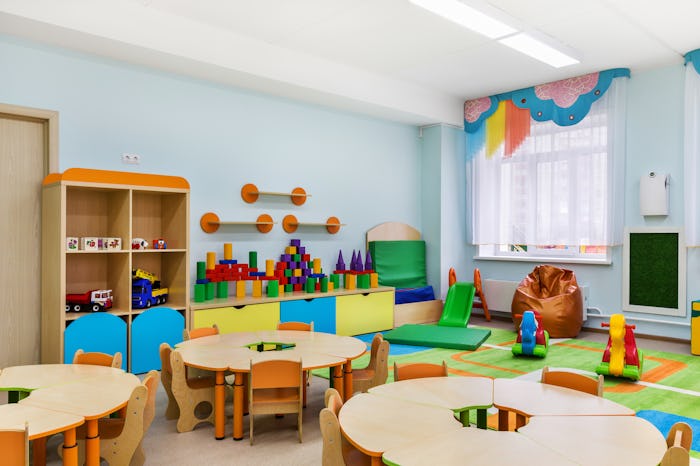Life

Here's How Day Cares Generally Handle Any Sleep Training You're Trying
If you're getting ready to start your kid in day care, you likely have a ton of questions. What will the transition be like? Who will cry more, me or baby? Is it OK that my little one hasn't yet met certain milestones? And, of course, are they going to sleep there? You may have made great strides with your kiddo's sleep at home, but will that all go out the window with their day care center? Sleep training and day care seem difficult to merge, so it's worth finding out if the center you choose will follow your sleep training or what policies they use.
According to the National Association of the Education of Young Children's (NAEYC) best recommended practices, the center is to be in a partnership with the family regarding the care of their children, Barbara Harvey, early childhood expert and Educational Director of Parents, Teachers and Advocates, Inc., tells Romper. "To this end," she notes, "the center should be accommodating each family's desires for their children, as long as those desires fall within the guidelines of developmentally appropriate practices."
Sleep schedules certainly fall within those parameters, notes Harvey, and every center should be accommodating to parental wishes when it comes to sleep schedules, regardless of the center's typical protocol. Of course, this isn't always the case, which means you might have to do some digging before definitively deciding on a day care that is a good fit for your family.
Riki Taubenblat, Certified Pediatric Sleep Consultant, tells Romper, "Smaller day cares that are located in a home environment and have fewer children are often willing to follow up with the parent's sleep training and may even provide a separate bedroom for naps, complete with white noise, and blackout curtains." But, the bigger the day care, the less room there is for individualized attention. And flexibility in scheduling tends to change as your child gets older.
"While most infant programs try to work with the family schedule, that can change as they hit toddler age. Most toddler and preschool programs that I know of offer a rest or nap time every day after lunch," says Mary Anderson, Early Childhood Education Program Director and Children’s College Coordinator at Bryant & Stratton College. Toddler programs, which typically begin anywhere from 12 to 14 months, have a set nap time — this helps kids fall into a consistent and predictable sleep routine, which is more developmentally appropriate at that age. If your child is going to day care daily, this is a great time to sync up your home schedule on the weekends to maintain consistency.
When it comes to actual sleep training, however, most day cares will not allow babies to cry for extended periods of time, mentions Nicole Johnson, owner of The Baby Sleep Site, nor do they want to. "Not only does it disturb the other children, but there isn’t anything worse than a parent who comes to pick up their child and see another child crying without being comforted," she tells Romper. So, if you're working on sleep training or self-soothing at home, it’s not totally likely day cares would do much sleep training, in terms of extended crying, at the center.
Because of the nature of child care centers, and the fact that there is usually many more babies than adults in an infant classroom, your child will pick up some good self-soothing skills, and presumably, those will carry over to home — making your naps and nights a bit easier, ideally.
Choosing a day care for your child is a big decision — one that you need to feel comfortable with. Trusting your child's caregivers is of the utmost importance, for both you and baby. So doing your due diligence beforehand will help you gain knowledge and insight into which center is best for your baby and family. The way they approach sleep in the classroom is definitely an important consideration.
Check out Romper's new video series, Bearing The Motherload, where disagreeing parents from different sides of an issue sit down with a mediator and talk about how to support (and not judge) each other’s parenting perspectives. New episodes air Mondays on Facebook.